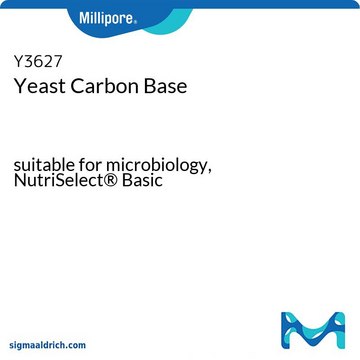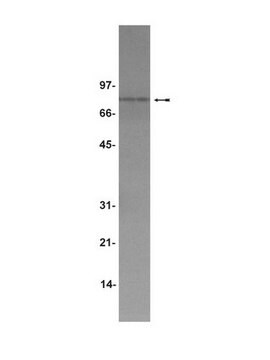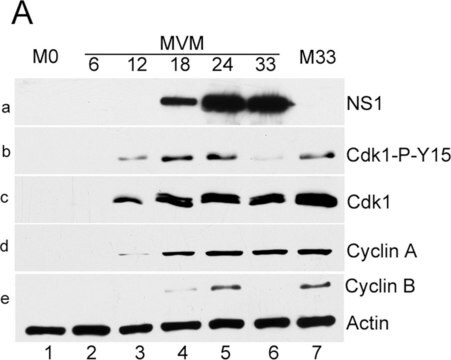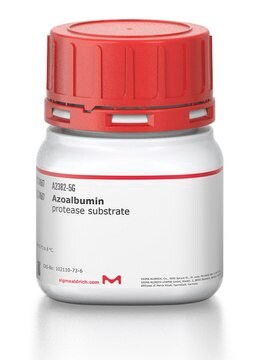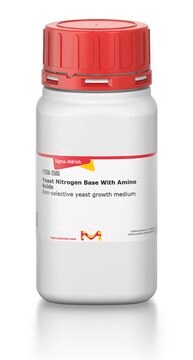07-095
Anti-PP2A-methylesterase/PME-1 Antibody
Upstate®, from rabbit
Faça loginpara ver os preços organizacionais e de contrato
About This Item
Código UNSPSC:
12352203
eCl@ss:
32160702
NACRES:
NA.41
Produtos recomendados
fonte biológica
rabbit
Nível de qualidade
forma do anticorpo
purified immunoglobulin
tipo de produto de anticorpo
primary antibodies
clone
polyclonal
reatividade de espécies
human, rat, mouse
fabricante/nome comercial
Upstate®
técnica(s)
western blot: suitable
Isotipo
IgG
nº de adesão NCBI
nº de adesão UniProt
Condições de expedição
dry ice
modificação pós-traducional do alvo
unmodified
Informações sobre genes
human ... PPME1(51400)
Especificidade
Protein Phosphatase Methylesterase-1
Imunogênio
A mixture of two nickel agarose-purified, His6-tagged, bacterial expressed human Protein Phosphatase Methylesterase-1 (PME-1) fragments (residues 225-302 and 277-387). These two fragments represent the carboxyl-terminal portion of the protein.
Aplicação
Research Category
Signaling
Neuroscience
Signaling
Neuroscience
Research Sub Category
Neurotransmitters & Receptors
Neurodegenerative Diseases
Neurotransmitters & Receptors
Neurodegenerative Diseases
This Anti-PP2A-methylesterase/PME-1 Antibody is validated for use in IP, WB for the detection of PP2A-methylesterase/PME-1.
Qualidade
routinely evaluated by immunoblot on RIPA lysates from mouse 3T3 fibroblasts
Descrição-alvo
44kDa
forma física
0.1M Tris-glycine, pH 7.4, 0.15M NaCl, 0.05% sodium azide before the addition of glycerol to 30%
Format: Purified
Protein A chromatography
Armazenamento e estabilidade
2 years at -20°C
Nota de análise
Control
Positive Antigen Control: Catalog #12-305, 3T3/A31 lysate. Add 2.5 μL of 2-mercapto-ethanol/100 μL of lysate and boil for 5 minutes to reduce the preparation. Load 20 μg of reduced lysate per lane for minigels.
Positive Antigen Control: Catalog #12-305, 3T3/A31 lysate. Add 2.5 μL of 2-mercapto-ethanol/100 μL of lysate and boil for 5 minutes to reduce the preparation. Load 20 μg of reduced lysate per lane for minigels.
Informações legais
UPSTATE is a registered trademark of Merck KGaA, Darmstadt, Germany
Exoneração de responsabilidade
Unless otherwise stated in our catalog or other company documentation accompanying the product(s), our products are intended for research use only and are not to be used for any other purpose, which includes but is not limited to, unauthorized commercial uses, in vitro diagnostic uses, ex vivo or in vivo therapeutic uses or any type of consumption or application to humans or animals.
Não está encontrando o produto certo?
Experimente o nosso Ferramenta de seleção de produtos.
Código de classe de armazenamento
10 - Combustible liquids
Classe de risco de água (WGK)
WGK 1
Certificados de análise (COA)
Busque Certificados de análise (COA) digitando o Número do Lote do produto. Os números de lote e remessa podem ser encontrados no rótulo de um produto após a palavra “Lot” ou “Batch”.
Já possui este produto?
Encontre a documentação dos produtos que você adquiriu recentemente na biblioteca de documentos.
Single-pot enzymatic synthesis of Dicer-substrate siRNAs.
Guiley, KZ; Pratt, AJ; MacRae, IJ
Nucleic Acids Research null
Kesava Asam et al.
PloS one, 12(12), e0189413-e0189413 (2017-12-19)
Soluble forms of oligomeric beta-amyloid (Aβ) are thought to play a central role in Alzheimer's disease (AD). Transgenic manipulation of methylation of the serine/threonine protein phosphatase, PP2A, was recently shown to alter the sensitivity of mice to AD-related impairments resulting
Ha Yin Lee et al.
Science signaling, 11(512) (2018-01-11)
Cancer cells increase glucose metabolism to support aerobic glycolysis. However, only some cancer cells are acutely sensitive to glucose withdrawal, and the underlying mechanism of this selective sensitivity is unclear. We showed that glucose deprivation initiates a cell death pathway
Agnieszka Staniszewski et al.
The Journal of neuroscience : the official journal of the Society for Neuroscience, 40(23), 4596-4608 (2020-04-29)
Beta-amyloid (Aβ) is thought to play a critical role in Alzheimer's disease (AD), and application of soluble oligomeric forms of Aβ produces AD-like impairments in cognition and synaptic plasticity in experimental systems. We found previously that transgenic overexpression of the
E Ogris et al.
The Journal of biological chemistry, 274(20), 14382-14391 (1999-05-13)
Carboxymethylation of proteins is a highly conserved means of regulation in eukaryotic cells. The protein phosphatase 2A (PP2A) catalytic (C) subunit is reversibly methylated at its carboxyl terminus by specific methyltransferase and methylesterase enzymes which have been purified, but not
Nossa equipe de cientistas tem experiência em todas as áreas de pesquisa, incluindo Life Sciences, ciência de materiais, síntese química, cromatografia, química analítica e muitas outras.
Entre em contato com a assistência técnica